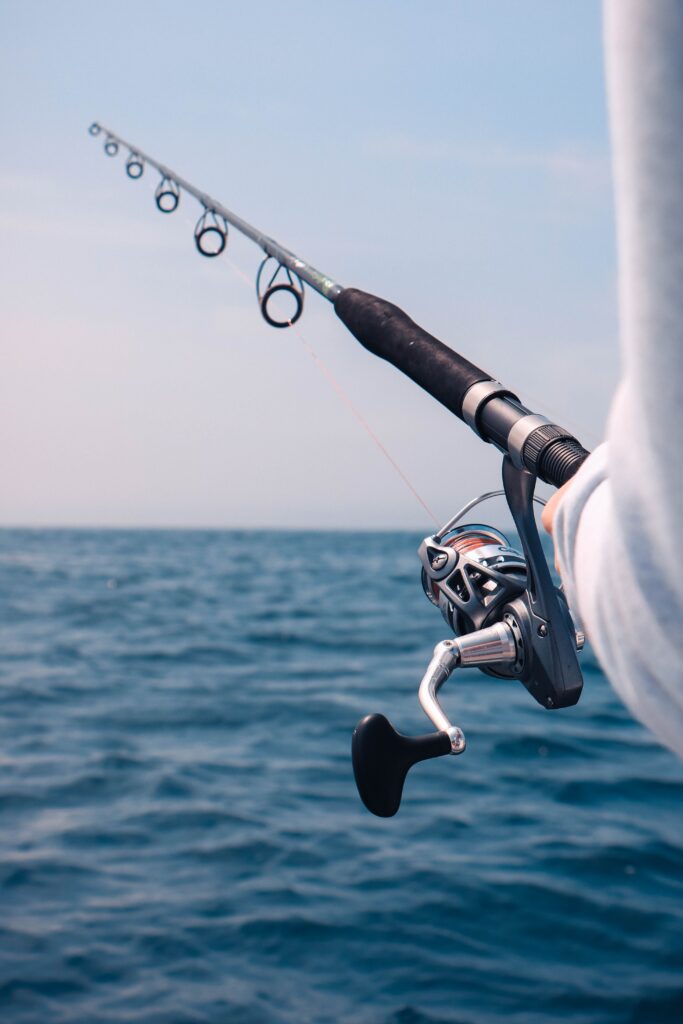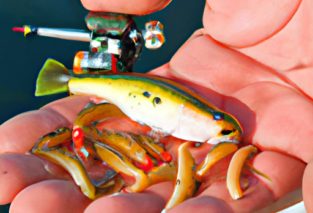Whether you’re a beginner or someone who’s been fishing for years, you’ll be fascinated to learn about the often overlooked but incredibly effective technique of using scents to attract fish. “The Role of Scents in Fishing: A Guide for Novices” is here to provide you with valuable insights and practical tips on how to harness the power of scents to enhance your fishing experience. From understanding why fish are drawn to certain smells to learning about the different types of scents and how to properly apply them, this comprehensive guide will help you maximize your chances of a successful catch. Get ready to embark on a fragrant journey that will revolutionize your fishing game!

1. Understanding the Importance of Scents in Fishing
Fishing is more than just casting a line and hoping for the best. As a novice angler, you may be surprised to learn that scents play a crucial role in attracting fish. Understanding the importance of scents will enhance your fishing experience and increase your chances of success.
1.1 The Impact of Scent in Attracting Fish
Have you ever wondered how fish can detect your bait in the vast expanse of water? The answer lies in their exceptional sense of smell. Fish rely heavily on their olfactory system to locate food and navigate their environment. When a fish encounters a scent it finds appealing, it becomes highly motivated to investigate and potentially bite.
1.2 How Fish Use Their Sense of Smell
Fish possess a specialized organ called the olfactory sac, located in their nostrils. This sac contains millions of scent receptors, making fish incredibly sensitive to odors in the water. The olfactory sac allows them to detect chemical signals emitted by potential prey or mating partners, even in low concentrations.
1.3 Advantages of Using Scents in Fishing
Using scents in fishing can provide several advantages. Firstly, scents can mask unnatural or human odors that may deter fish from approaching your bait. Secondly, scents can attract fish from a distance and entice them to investigate further. Lastly, scents can enhance the attractiveness of your bait, making it more appealing than other options in the vicinity.
2. Different Types of Fishing Scents
There are two main types of fishing scents: natural scents and artificial scents. Each type has its own distinct advantages and uses.
2.1 Natural Scents
Natural scents are derived from various organic sources, such as fish oils, shrimp, crayfish, or other natural substances that mimic the scent of prey. These scents closely resemble the odors that fish are naturally attracted to, increasing the chances of enticing them to bite.
2.2 Artificial Scents
Artificial scents, on the other hand, are chemically formulated scents that are designed to mimic the smell of natural prey. These scents are often created using a combination of synthetic compounds and additives that are intended to attract fish. The advantage of artificial scents is that they are highly concentrated and can be customized to target specific species.
2.3 Common Scents Used in Fishing
Some of the most common scents used in fishing include garlic, anise, shrimp, crawfish, and various fish oils. These scents have proven to be effective in attracting a wide range of fish species. Experimenting with different scents can help you determine which ones work best for the fish you are targeting.

3. Understanding the Science Behind Scents
To fully harness the power of scents in fishing, it is essential to understand the science behind how scents work and interact with fish.
3.1 Chemical Reactions and Fish Attraction
When a fish encounters a scent in the water, it triggers a chemical reaction in its brain that stimulates its feeding response. The specific chemicals emitted by the scent interact with the fish’s olfactory system, sending signals to the brain that food is nearby. This reaction is what ultimately attracts fish to your bait.
3.2 Factors Affecting Scent Effectiveness
Several factors can influence the effectiveness of scents in attracting fish. Water conditions, such as clarity and temperature, can impact how well a scent travels and disperses. The type of fish you are targeting, their feeding preferences, and the availability of natural food sources in the area can also affect how receptive they are to certain scents.
3.3 The Role of Water Temperature in Scent Dispersion
Water temperature plays a significant role in scent dispersion. Warmer water temperatures tend to enhance the effectiveness of scents, as the molecules move more rapidly and disperse farther. Conversely, in colder water, the scent molecules move slower and may not travel as far, requiring closer proximity to the fish for detection.
3.4 Scent Duration and Persistence
The duration and persistence of scents can vary depending on factors such as water flow and temperature. Some scents may dissipate quickly, requiring frequent reapplication, while others can last for extended periods. Understanding the longevity of different scents is crucial to ensure that your bait remains enticing throughout your fishing expedition.
3.5 Understanding Fish Behavior in Relation to Scents
Different fish species have varying responses to scents. Some fish are highly selective in their feeding preferences and may be more attracted to specific scents, while others are more opportunistic and may respond to a broader range of scents. Observing fish behavior and learning about their feeding habits can help you choose the most effective scents for your target species.
4. Techniques for Applying Scents to Fishing Lures or Baits
Now that you have a grasp of the importance and science behind scents in fishing, it’s time to explore different techniques for applying scents to your lures or baits.
4.1 Direct Application on Lures or Baits
One of the simplest ways to use scents is to apply them directly to your lures or baits. You can do this by squirting or spraying the scent onto the surface of the lure. Ensure that the entire surface is covered, as this maximizes the scent’s effectiveness in attracting fish.
4.2 Using Scent-infused Bait
Another popular method is using pre-infused bait with scents. Many fishing bait manufacturers offer scented baits that are specifically designed to attract fish. These baits are impregnated with the scent, providing a long-lasting and consistent aroma that is highly attractive to fish.
4.3 Soaking Lures or Baits in Scents
Soaking your lures or baits in scents is another effective way to disperse the scent throughout the water. Simply place your lures or baits in a container with the chosen scent and let them absorb the aroma. This method allows the scent to permeate the water, increasing the odds of luring in fish from a wider area.
4.4 Utilizing Scent Attractants in Attractant Bags
Attractant bags are small mesh bags that contain scented substances. These bags can be attached to your fishing line or hooks, releasing the scent into the water as you fish. Attractant bags are particularly effective in attracting fish in areas of low visibility, such as murky or stained water.

5. Common Scenarios Where Scents Enhance Fishing Success
Scents can be particularly advantageous in certain fishing scenarios. Understanding these scenarios will help you make the most of scents and improve your chances of success.
5.1 Murky or Stained Water Fishing
In situations where the water is murky or stained, visibility is limited, making it harder for fish to locate your bait visually. Scents can be a game-changer in these conditions, as fish rely heavily on their sense of smell to locate food. By attracting fish with scents, you increase your chances of making a catch in less-than-ideal water conditions.
5.2 Fishing in Cold Water
Coldwater poses unique challenges for anglers, as fish tend to slow down and become less active. Scents can play a vital role in enticing fish to bite in these colder temperatures. Ensure you choose scents that are effective in lower water temperatures and apply them generously to increase the chances of attracting fish.
5.3 Targeting Specific Fish Species
If you are targeting a specific fish species, utilizing scents can be highly beneficial. Certain scents are known to be particularly appealing to particular species, helping you narrow down your bait choices and attract your desired catch. Researching the preferences of the fish you are targeting and selecting the appropriate scents can significantly improve your success rate.
5.4 Fishing in High-Pressure Areas
In heavily fished areas where fish have become wary of traditional bait, scents can give you an advantage. By introducing a unique and enticing scent, you can pique the curiosity of fish and entice them to bite, even in areas where they may be more cautious. This can make a significant difference in your fishing success rate in high-pressure fishing spots.
6. Tips for Maximizing the Effectiveness of Scents in Fishing
To maximize the effectiveness of scents in your fishing endeavors, consider these tips:
6.1 Use Scents in Combination with Other Techniques
While scents can be highly effective, they should not be solely relied upon. Combining scents with other proven fishing techniques, such as proper casting, presentation, and location, can significantly enhance your chances of success. Scents should be used as one tool in your arsenal, working in harmony with other strategies.
6.2 Experiment with Different Scents
Not all scents work equally well for every fish species or fishing scenario. Experimenting with different scents allows you to discover which ones are most effective for the fish you are targeting and the environment you are fishing in. Keep a variety of scents on hand and be willing to adapt your approach based on the conditions and fish behavior.
6.3 Apply Scents Properly and Reapply as Needed
Proper application and reapplication of scents are crucial for maintaining their effectiveness. Ensure that you follow the manufacturer’s instructions for applying the scent to achieve the best results. Remember to reapply or refresh the scent as needed, especially if you notice a decrease in fish activity or the scent’s potency.
6.4 Store Scents Correctly
To preserve the quality and effectiveness of your scents, proper storage is essential. Most scents are sensitive to heat, light, and air exposure, which can degrade their potency. Store your scents in a cool, dark place, such as a tackle box or refrigerator, to maintain their freshness and maximize their shelf life.

7. Potential Drawbacks and Considerations of Using Scents
While scents can be highly advantageous in fishing, it is essential to be aware of potential drawbacks and consider certain factors before incorporating scents into your fishing routine.
7.1 Over-reliance on Scents
It is crucial not to become overly dependent on scents alone for fishing success. Fish are intelligent creatures and can become conditioned to specific scents over time. Relying solely on scents may limit your ability to adapt to changing fishing conditions and fish behavior. Remember to combine scents with other proven fishing techniques to increase your chances of overall success.
7.2 Sensitivity of Some Fish Species
While many fish species are attracted to scents, it is important to recognize that some species may be less receptive or even deterred by certain scents. Research the preferences of the fish you are targeting and consider their known behaviors before selecting a scent. Being aware of species-specific sensitivities will help you make more informed choices and increase your likelihood of success.
7.3 Environmental Impact and Responsibility
When using scents in fishing, it is essential to prioritize environmental impact and responsible angling practices. Some scents may contain chemical compounds that can harm aquatic life or the water ecosystem if used improperly or excessively. Always follow the recommended application guidelines and avoid using scents in sensitive or protected areas. As responsible anglers, it is our duty to ensure the long-term health and preservation of our natural resources.
8. DIY Scents: Creating Your Own Fishing Attractants
If you enjoy a hands-on approach and want to explore alternatives to commercial scents, creating your own fishing attractants can be a rewarding endeavor. Here are some tips for making your own DIY scents:
8.1 Natural Ingredients and Extracts
Harnessing the power of natural ingredients and extracts can be an effective way to create your own scents. Consider using ingredients such as garlic, anise, shrimp shells, or fish oils. These natural substances can be combined in different proportions to create unique scents that appeal to a wide range of fish species.
8.2 Mixing and Storing Homemade Scents
When creating homemade scents, it is crucial to measure and mix the ingredients carefully to achieve the desired scent profile. Store the homemade scents in airtight containers, away from heat and light, to maintain their freshness. Keep in mind that homemade scents may have varying effectiveness compared to commercial options, so experimentation and fine-tuning may be necessary.
8.3 Safety Precautions and Best Practices
When working with scents and creating your own attractants, always prioritize safety. Some natural or homemade scents may contain allergens or irritants, so take necessary precautions such as wearing gloves and avoiding contact with your eyes or mouth. It is also advisable to research and understand the potential impact of the ingredients on aquatic life before using them extensively.

9. Frequently Asked Questions (FAQs) About Fishing Scents
As a novice angler, you may have several questions about fishing scents. Here are some commonly asked questions and their answers:
9.1 Are Scents Legal to Use in Fishing?
Scents are legal to use in fishing in most areas. However, it is always recommended to check local fishing regulations to ensure that scents are permitted. Some bodies of water or protected areas may have specific rules regarding the use of scents to preserve the ecosystem.
9.2 Can Scents Guarantee More Fish?
While scents can increase your chances of attracting fish, they do not guarantee more catches. Fishing success depends on various factors, including the fish’s behavior, environmental conditions, and your fishing techniques. Scents should be used in conjunction with other proven methods to maximize your overall success rate.
9.3 How Long Does a Scent Last on a Lure?
The duration of a scent on a lure depends on several factors, such as the type of scent, water conditions, and the lure’s exposure to water movement. Some scents may last several casts, while others may require more frequent reapplication. Monitoring fish activity and reapplying the scent as needed will help ensure its effectiveness.
9.4 Are There Scents That Repel Fish?
While scents are primarily used to attract fish, certain scents may repel fish or deter them from approaching your bait. Strong or unnatural scents, such as gasoline or insect repellents, can have a repellent effect on some fish species. It is best to avoid using scents that may deter the fish you are targeting.
9.5 Can Scents Attract Unwanted Species?
Scents can attract a wide range of fish species, including both desired and unwanted species. While targeting specific fish species with scents, it is important to consider the potential for attracting non-target species. Researching the feeding preferences of the fish you want to catch and selecting scents accordingly can help minimize the chances of attracting unwanted catches.
9.6 How Often Should I Reapply the Scent on My Bait?
The frequency of scent reapplication depends on various factors, including water conditions, fish activity, and the nature of the scent itself. It is advisable to monitor fish behavior and pay attention to any decrease in activity or response to your bait. If you notice a decline in effectiveness, reapplying the scent may be necessary to maintain its allure.
10. Recommended Scents for Beginner Anglers
If you’re a beginner angler looking to enhance your fishing experience with scents, here are three recommended brands:
10.1 Brand A: Scents for All-Purpose Fishing
Brand A offers a range of scents that are highly effective for all-purpose fishing. Their scents have been tested and proven to attract a broad spectrum of fish species in various fishing scenarios. Beginners can start with their all-purpose scent to gain confidence and familiarity with using scents in their fishing endeavors.
10.2 Brand B: Scents for Specific Fish Species
Brand B specializes in scents formulated specifically to attract certain fish species. From bass to trout or catfish, Brand B provides scents tailored to the preferences of each species. Beginner anglers targeting specific fish can benefit from using Brand B’s species-specific scents to increase their chances of success.
10.3 Brand C: Environmentally Friendly Scents
For environmentally conscious anglers, Brand C offers scents that are formulated with minimal impact on the water ecosystem. Their scents are made from environmentally friendly ingredients and produced through sustainable practices. Choosing Brand C’s scents allows beginner anglers to enjoy the benefits of scents while minimizing their ecological footprint.
In conclusion, understanding the importance of scents in fishing and adopting effective scent application techniques can significantly enhance your chances of success as a novice angler. By harnessing the power of scents, you can attract fish, mask human odors, and increase the allure of your bait. Remember to consider the science behind scents, experiment with different types, and be aware of any potential drawbacks or environmental considerations. With proper knowledge and application, scents can become a valuable tool in your fishing arsenal, leading to more enjoyable and fruitful angling experiences.





